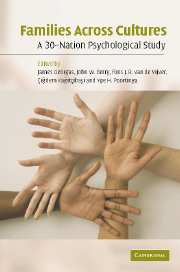Book contents
- Frontmatter
- Contents
- List of figures
- List of tables
- List of contributors
- Acknowledgments
- Prologue
- Part I
- Part II
- 9 The Algerian family: change and solidarity
- 10 Botswana
- 11 The Brazilian jeitinho: Brazil's sub-cultures, its diversity of social contexts, and its family structures
- 12 Britain
- 13 Bulgaria: socialism and open-market economy
- 14 Canada
- 15 Chile: new bottle, old wine
- 16 Cyprus
- 17 Portrait of family in France
- 18 Georgia
- 19 Germany: continuity and change
- 20 Ghana
- 21 Greece
- 22 Hong Kong, SAR China: transitions and return to the motherland
- 23 India
- 24 Indonesia: traditional family in a changing society
- 25 The Iranian family in a context of cultural diversity
- 26 Japan: tradition and change in the Japanese family
- 27 Mexico
- 28 Mongolia: traditions and family portrait
- 29 The Netherlands: tolerance and traditionalism
- 30 Nigeria
- 31 Pakistan: culture, community, and filial obligations in a Muslim society
- 32 The Saudi society: tradition and change
- 33 The South African family
- 34 South Korea
- 35 Spain: tradition and modernity in family structure and values
- 36 Turkey
- 37 Ukraine
- 38 Family in the United States: social context, structure, and roles
- Appendix
- References
- Index
33 - The South African family
Published online by Cambridge University Press: 10 December 2009
- Frontmatter
- Contents
- List of figures
- List of tables
- List of contributors
- Acknowledgments
- Prologue
- Part I
- Part II
- 9 The Algerian family: change and solidarity
- 10 Botswana
- 11 The Brazilian jeitinho: Brazil's sub-cultures, its diversity of social contexts, and its family structures
- 12 Britain
- 13 Bulgaria: socialism and open-market economy
- 14 Canada
- 15 Chile: new bottle, old wine
- 16 Cyprus
- 17 Portrait of family in France
- 18 Georgia
- 19 Germany: continuity and change
- 20 Ghana
- 21 Greece
- 22 Hong Kong, SAR China: transitions and return to the motherland
- 23 India
- 24 Indonesia: traditional family in a changing society
- 25 The Iranian family in a context of cultural diversity
- 26 Japan: tradition and change in the Japanese family
- 27 Mexico
- 28 Mongolia: traditions and family portrait
- 29 The Netherlands: tolerance and traditionalism
- 30 Nigeria
- 31 Pakistan: culture, community, and filial obligations in a Muslim society
- 32 The Saudi society: tradition and change
- 33 The South African family
- 34 South Korea
- 35 Spain: tradition and modernity in family structure and values
- 36 Turkey
- 37 Ukraine
- 38 Family in the United States: social context, structure, and roles
- Appendix
- References
- Index
Summary
A HISTORICAL OUTLINE OF SOUTH AFRICA
After the British seized the Cape of Good Hope area in 1806, many of the Dutch settlers (the Boers) trekked north to found their own republics. The discovery of gold (1866) and diamonds (1867) spurred wealth and immigration and intensified the subjugation of the original indigenous Africans. The Boers resisted British encroachment, but were defeated in the Boer War of 1899–1902. The resulting union of South Africa operated under a policy of apartheid – a notoriously difficult phenomenon to characterize. This is evident by the hugely divergent adumbrations apartheid has received in literature on South African politics and history. South Africa's present population is approximately 43,647,658 inhabitants, its area of land is 1,217,912 km2. Pretoria is its capital, with 1,080,187 inhabitants. In addition to the capital, important cities are Cape Town (2,350,157), Johannesburg (5,700,000), and Durban (1,378,792). South Africa is a founding member of the African Union.
The apartheid project
No blueprint or apartheid grand plan existed by 1948 when the Herstigte Nationale Party (HNP) was victorious at the polls (Norval, 2001). Formed in 1914, the party banned liberation movements including the Pan-Africanist Congress (PAC) and African National Congress (ANC) and jailed thousands of activists and political leaders, among them Nelson Mandela during its rule. It used a “womb to tomb” surveillance plan for the subjugated African populations, as well as the overtly racist construction of the black Africa or North Africa (Mandela, 1994; Mbeki, 2002; Norval, 2001; Seepe, 2004).
- Type
- Chapter
- Information
- Families Across CulturesA 30-Nation Psychological Study, pp. 442 - 449Publisher: Cambridge University PressPrint publication year: 2006
- 2
- Cited by



